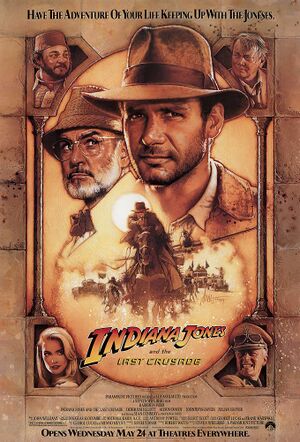Indiana Jones and the Last Crusade: Difference between revisions
(add video games) |
(add and) |
||
| Line 33: | Line 33: | ||
It was the third [[adventure game]] that was developed with the [[SCUMM]] scripting language. | It was the third [[adventure game]] that was developed with the [[SCUMM]] scripting language. | ||
It was released for [[AmigaOS]], [[Atari ST]], [[CDTV]], [[DOS]], [[FM Towns]], [[Mac OS]]. | It was released for [[AmigaOS]], [[Atari ST]], [[CDTV]], [[DOS]], [[FM Towns]], and [[Mac OS]]. | ||
''[[Indiana Jones and the Last Crusade: The Action Game]]'' was an action [[video game]] developed by [[Tiertex]] and published by Lucasfilm Games. | ''[[Indiana Jones and the Last Crusade: The Action Game]]'' was an action [[video game]] developed by [[Tiertex]] and published by Lucasfilm Games. | ||
Latest revision as of 20:21, 25 September 2024

| |
| Indiana Jones and the Last Crusade | |
| Produced by | Lucasfilm |
|---|---|
| Distributor | Paramount Pictures |
| Formats | BD, Beta, Digital, DVD, LD, VCD, VHS |
| Released | Film, US: May 24, 1989 |
| Added to Museum |
Not yet |
Indiana Jones and the Last Crusade was the third film in the Indiana Jones series.
It received a wide release on May 24, 1989. Indiana Jones and the Last Crusade was produced by Lucasfilm and was distributed by Paramount Pictures.
Plot
In 1938, Henry Jones, Sr. was kidnapped. His son, Henry Jones, Jr., better known as Indiana Jones, discovered that his father was taken due to his research on the fabled Holy Grail. The artifact was rumored to be the key to eternal life.
After Indiana Jones rescued his father, the duo head into the heart of nazi territory to get his father's grail journal.
The journal held the secret to reach the grail, which the father and son raced to get before the nazis.
Comic book adaptation
A comic book adaptation of Indiana Jones and the Last Crusade was written by David Michelinie with art by Bret Blevins. It was published by Marvel Comics in four parts from June to July 1989.
The story follows that of the film. However, it does differ from the film in minor ways with some differing dialog, locations, and character appearances. The comic book adaptation was reprinted in "Indiana Jones Omnibus: The Further Adventures Volume 3" by Dark Horse Comics on February 24, 2010.
Video game adaptations
Indiana Jones and the Last Crusade: The Graphic Adventure was developed and published by Lucasfilm Games
It was the third adventure game that was developed with the SCUMM scripting language.
It was released for AmigaOS, Atari ST, CDTV, DOS, FM Towns, and Mac OS.
Indiana Jones and the Last Crusade: The Action Game was an action video game developed by Tiertex and published by Lucasfilm Games.
It was released for 1989 for AmigaOS, Amstrad CPC, Atari ST, Commodore 64, DOS, Game Boy, Game Gear, MSX, Nintendo Entertainment System, Sega Genesis, and Sega Master System.
Lego Indiana Jones: The Original Adventures was a Lego video game that contained an adaptation of Indiana Jones and the Last Crusade alongside adaptations of Raiders of the Lost Ark and Indiana Jones and the Temple of Doom.
The PS2, PS3, PSP, Wii, Windows, and Xbox 360 versions were developed by Traveller's Tales. The Nintendo DS version was developed by TT Fusion. Each of these versions of the game were published by LucasArts in North America on June 3, 2008, in Oceania on June 4, 2008, and in Europe on June 6, 2008. A macOS version was developed by Traveller's Tales and published by Feral Interactive worldwide on December 4, 2008.
Lego Indiana Jones 2: The Adventure Continues was a Lego video game that contained an adaptation of Indiana Jones and the Last Crusade alongside adaptations of Raiders of the Lost Ark, Indiana Jones and the Last Crusade, and Indiana Jones and the Kingdom of the Crystal Skull.
It was developed for Nintendo DS, PS3, Wii, Windows, and Xbox 360 by Traveller's Tales and was published by LucasArts in North America on November 17, 2009, in Oceania on November 20, 2009, and in Europe on November 25, 2009. A macOS version was developed by Traveller's Tales and published by Feral Interactive worldwide on April 2, 2011.



